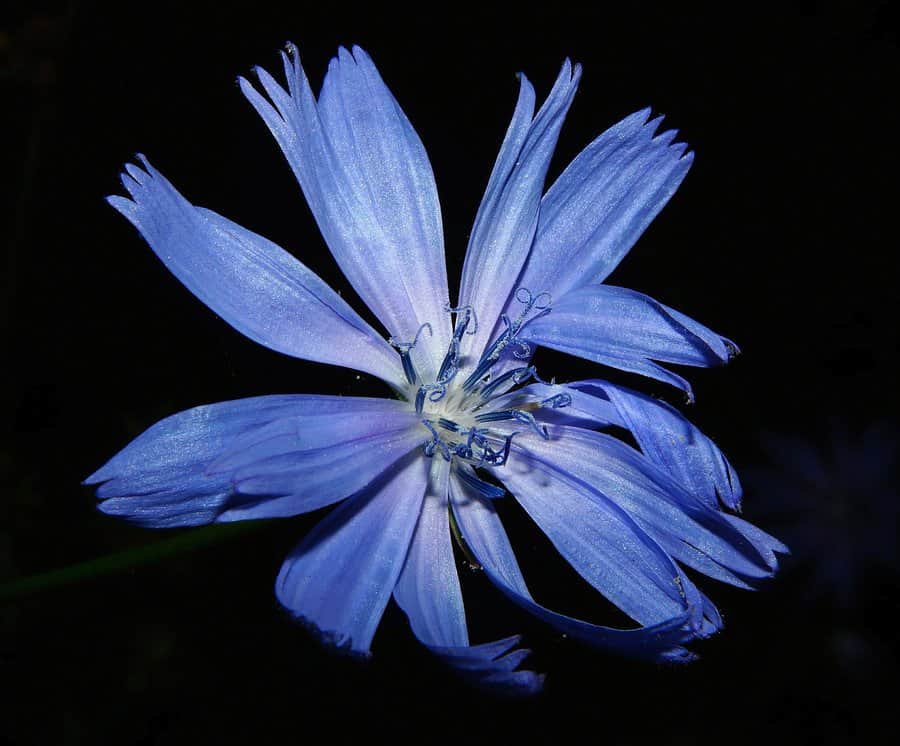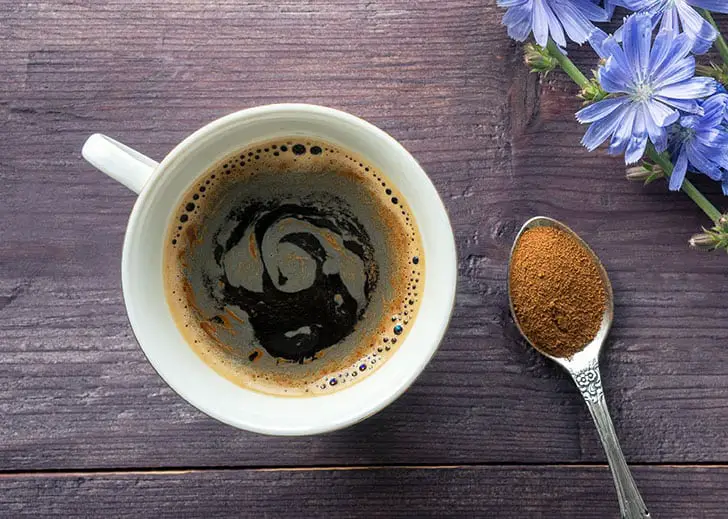
Chicory coffee is made from the roasted and ground roots of the chicory plant. It has a rich, slightly bitter flavor that is often compared to coffee, although it is caffeine-free.
Chicory coffee is also rich in antioxidants, which can help to protect the body from oxidative stress and prevent chronic diseases. It is a great option for those who are sensitive to caffeine or want a healthier alternative to traditional coffee.
Does that sound interesting and something you would like to try? Continue reading to see if chicory coffee is a good choice for you.
What Is The Chicory Flower?

The chicory flower is not only known for its beauty, but it also has a unique relationship with coffee. Chicory root is roasted and ground to create a coffee-like beverage that is often used as a coffee substitute or blend.
This practice dates back to the 1800s when coffee was in short supply and people needed a caffeine-free alternative. The addition of chicory root to coffee not only adds a rich, slightly bitter flavor, but it also increases the volume of the coffee, making it a cost-effective option.
Today, chicory coffee is still enjoyed by many people, especially in New Orleans where it is a staple in the local coffee culture.
What Is The Story of Chicory?
Even though we are not aware of its origin, some people believe that it originated from the Mediterranean regions. The long history of this plant dates back to ancient Egypt.
People have been cultivating chicory for various reasons and you will find it all over the world. The ancient Egyptians used this plant due to its medicinal properties, while the Greeks, Romans, and Turks used the leaves as vegetables when preparing salads and some other key dishes.
The plant has a bitter taste, which influenced people from different cultures to use it for some other purposes, such as an animal feed, stimulator, and a coffee grounds substitute. After nearly 5,000 years, Chicory landed in Northern America, particularly the southern regions.
Chicory became one of the key exports for European countries around the 19th century. Due to its popularity, the chicory spice spread all over the continent – from Belgium to Holland, Denmark, and Germany. Although German women adopted it as a daily product, it was a household choice in France.
7 Health Benefits of Chicory
Chicory is a versatile and nutritious plant that has been used for medicinal purposes for thousands of years. It is a rich source of vitamins, minerals, and antioxidants, making it a great addition to a healthy diet. The following are some of the key health benefits of chicory:
- Rich in Fiber: Chicory root is an excellent source of fiber, which is important for maintaining good digestive health. It contains inulin, a type of soluble fiber that helps to regulate blood sugar levels, lower cholesterol, and improve gut health. Inulin also acts as a prebiotic, which helps to promote the growth of good bacteria in the gut.
- Supports Liver Health: Chicory contains compounds that are beneficial for liver health. It has been shown to reduce liver damage, improve liver function, and protect the liver from toxins. This makes chicory a great option for those who want to support their liver health and prevent liver-related diseases.
- Antioxidant Properties: Chicory is rich in antioxidants, which are compounds that help to protect the body from oxidative stress and prevent chronic diseases. Antioxidants can help to prevent cellular damage and protect against cancer, heart disease, and other conditions.
- Reduces Inflammation: Chicory contains compounds that have anti-inflammatory properties. Inflammation is a key factor in the development of many chronic diseases, so reducing inflammation through diet is important for overall health. Chicory can help to reduce inflammation throughout the body, making it a great option for those who want to reduce their risk of disease.
- Supports Bone Health: Chicory root is a good source of calcium, which is important for bone health. Calcium is a key mineral that helps to maintain strong bones and prevent osteoporosis. Chicory is also a source of magnesium, which is important for maintaining bone density and preventing bone fractures.
- Boosts Immune System: Chicory contains compounds that help to boost the immune system. It has been shown to increase the production of white blood cells, which are the cells that help to fight off infections and diseases. Chicory is also a source of vitamin C, which is important for a healthy immune system.
- Supports Weight Management: Chicory root is a low-calorie food that is high in fiber. This makes it a great option for those who want to manage their weight, as it helps to keep you feeling full and satisfied. Chicory is also a good source of B vitamins, which help to regulate metabolism and promote weight loss.
How to Make Raw Chicory For Coffee
If you want to make chicory coffee and you don’t want to get it from a specialty store or Amazon, Here’s a step-by-step process:
- Obtain chicory root: You can purchase raw chicory root from health food stores or online. Make sure to choose high-quality roots that are free of any dirt or debris.
- Clean the root: Rinse the chicory root and remove any dirt or debris. Cut the root into small pieces.
- Grind the root: Place the pieces of chicory root in a coffee grinder and grind until it becomes a fine powder. Depending on the size of your grinder, this may take a few minutes.
- Store the chicory: Transfer the ground chicory root to an airtight container and store in a cool, dry place until you are ready to use it.
Making raw chicory for coffee is a simple and straightforward process. It is a great alternative for those who want to reduce their caffeine intake or avoid coffee altogether. The slightly bitter flavor of raw chicory adds a unique twist to your morning cup of coffee and provides numerous health benefits.
How Does Chicory Coffee Taste
Chicory coffee has a unique taste profile that is distinct from traditional coffee. It has a rich, slightly bitter flavor that is reminiscent of dark roast coffee. The flavor is often described as earthy, nutty, or slightly sweet.
Some people enjoy the slightly bitter taste of chicory coffee, while others prefer to add milk, sugar, or sweeteners to help balance out the flavor. The taste of chicory coffee can also vary depending on the roast level and the origin of the chicory root.
Some chicory roots are roasted longer, which results in a darker and more intense flavor, while others are roasted for a shorter time, producing a milder and more balanced taste. Despite its unique flavor, chicory coffee has a smooth and full-bodied taste that is enjoyed by many coffee drinkers.
Why is Chicory Coffee Famous in New Orleans?

Because New Orleans stood as the largest trading port of France in North America, coffee had become a key part of the New Orleans Culture. Coffee plantations characterised the region and the workers grabbed warm cups of coffee from the Creole maidens who sold them in French Quarters. By the year 1840, the New Orleans port stood as the second largest coffee importer in the US.
New Orleans was a leader in the coffee industry for over two decades, but the situation changed after the Civil War prevented ships from reaching the port.
The locals were so desperate for coffee that they started experimenting with various natural products to make the taste that they had grown to love. Just as their France ancestors did, they adopted chicory as the perfect coffee substitute.
Over the years, they used chicory during the economic struggle times and after the supply of coffee was very low. Their struggle for coffee made chicory a key staple.
Today, chicory is an ingredient that has made New Orleans coffee unique and popular. The locals believe that chicory is part of the city’s culture and tradition and they will tell you that it has a great taste and it is wonderfully unique. However, they are unlikely to tell you that chicory offers many health benefits.
With Indians blending it into their teas and the Egyptians used it as a medicine, it is evident that the plant can fight against various ailments like jaundice, arthritis, and gout and help save some of the body organs. When drinking it, you should be certain that you are drinking something that is part of a unique culture and something that has a great taste.
How To Brew Chicory Coffee using a French Press
I like to make this coffee with a French Press as its easy to do and comes out great. Here is a simple French Press recipe with Chicory. You will need a scale, a burr grinder and a timer to get the best brew:
Step 1 Use Fresh Roasted Coffee
Get some fresh roasted coffee from you local roaster. I like to use Brazil coffee as it has a nice chocolate nutty taste that mixes well with the chicory.
Step 2 Grind the Coffee
Using a Coarse Setting, grind 20 grams of coffee and pour it into your French Press
Step 3 – Grind the Chicory
This is subjective but grind up 4 grams of chicory, you can buy from Amazon or local specialty store and add it to the Coffee in the French Press
Step 4 – Get The French Press Ready
Put the French Press on the scale and Tare It.
Step 5 – Heat up the Water
Heat your water to 205 degrees Fahrenheit or boil the water and after 30 seconds pour in 300g of water into the French Press
Step 6 – Use the Timer
Start the timer and let the coffee brew for 4 minutes At 4 minute, use the plunger and press down until it stops.
Step 7 – Enjoy
Now just pour into your cup and ENJOY!!!!
Adding Milk To Chicory Coffee
When in New Orleans you will see a lot if not most of the people drinking there chicory coffee with milk and like in France they call it a Cafe Au Lait. The reason for this is 2 part:
- One is due to tradition where they have there coffee with half milk and half chicory coffee
- The second reason is because they coffee they used was bitter (as can be the case today) so when milk is added it cuts down on the bitterness of the coffee and makes it more enjoyable to drink. If you want to really go crazy you could try it with Almond Milk!
Cafe Du Monde And Chicory Coffee

Dignitaries, debutantes, anglers, and farmers lined up to get some powdered beignet and the caffeine buzz – they were commonest social equalizers. With the cups of coffee and the sticky fingers, the class differences were no more and the hierarchy flattened. People were there to mix sweetness and bitterness – it was simple.
People have brewed chicory coffee for many centuries. In the late 1700s, the beans passed through the ports of the Caribbean and Cuba. By the 18th century, people were retailing them in New Orleans and could use it in their homes. Coffee stalls came up in the French Market.
Rose Nicaud, one of the freed slaves, managed to attract many customers by simply calling out some of her famous brews. People could easily describe her coffee as they would describe other products.
Fred Koeniger started peddling caffeine in 1862 in his French Market stall. That was the Café du Monde. Even though he started small, with coffee alone, the competition was little and he would serve it with a beignet.
The date he introduced chicory and coffee in the menu of Café du Monde has remained unknown and debates on how beignets entered New Orleans have been in existence.
The origin might be important, but there is one fact that stands – without the beignet Café du Monde would not have landed on the map and possibly, it would not remain there for over 155 years.
Today, in Jackson Square corner, you will find cooks turning beignets very fast, while coffee brews on the nearby counters.
In the kitchen, you will realize that flour covers almost everything – fingers, hands, elbows, pants and shoes and the powdered sugar gathers on the floor, regardless of the season. The waiters serve the beignet with café au lait, which they lace with chicory and it is nearly white.
And because Café du Monde remains open 24/7 throughout the year, customers from all parts of the world go there to drink and eat.
Final Thoughts
If you want to try something different whether you are in New Orleans or at home you should buy or make your own chicory coffee. Its unique flavor and taste will be a nice change of pace from your normal coffee routine and will be pleasant surprise for friends and guests that come to visit.

